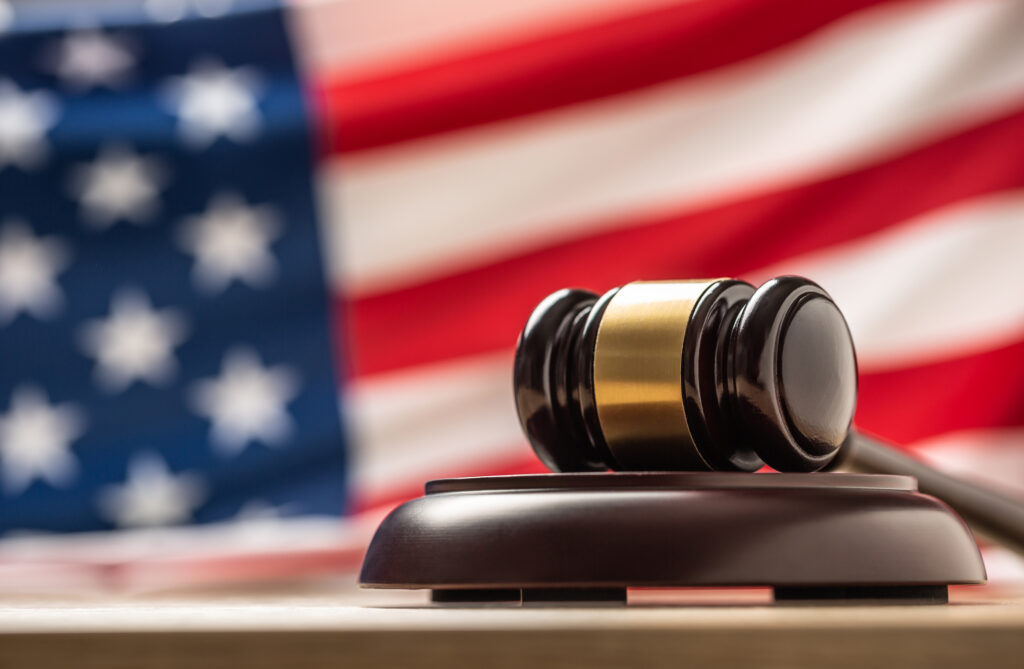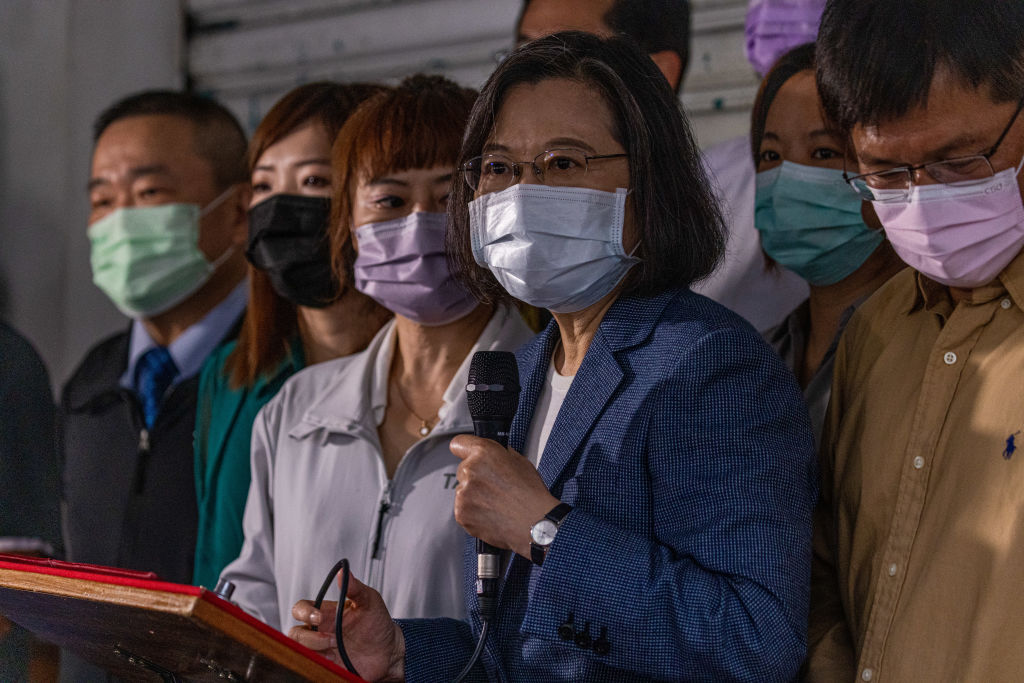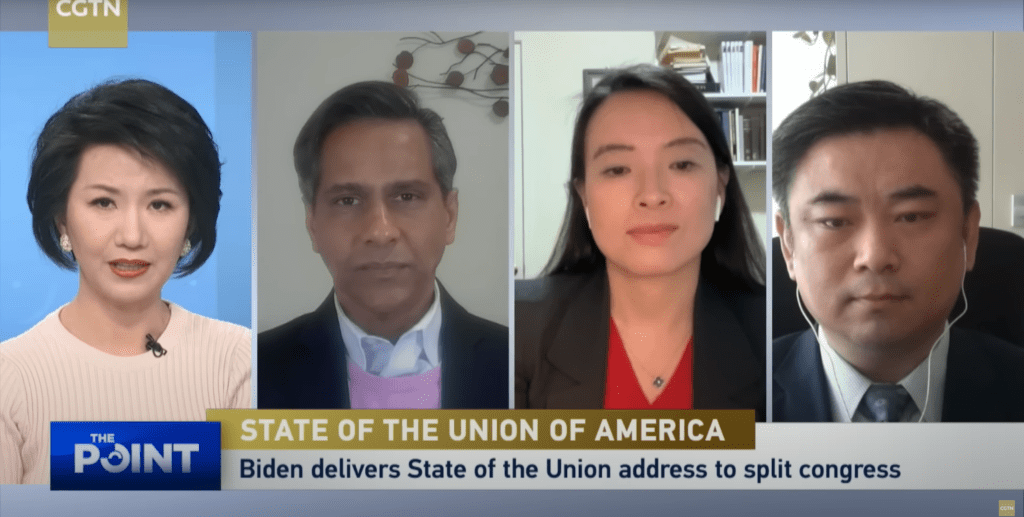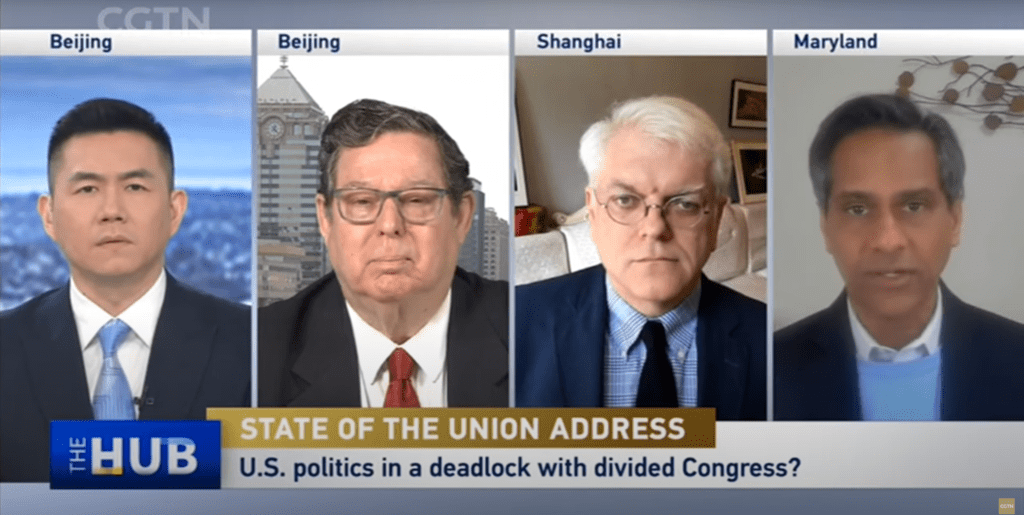
ICAS Bulletin (online ISSN 2836-3418, print ISSN 2836-340X) is published every other week throughout the year at 1919 M St NW, Suite 310, Washington, DC 20036.
The online version of ICAS Bulletin can be found at chinaus-icas.org/bulletins/.

– U.S. President Biden stated that the Chinese surveillance balloon, discovered two weeks ago over Montana, did not damage bilateral relations, emphasizing strategic competition not conflict.
– The Chinese Foreign Ministry spokesman Wang Wenbin stated that, “It is also common for US balloons to illegally enter the airspace of other countries,” in-response to the Chinese surveillance balloon.
– Secretary of State Antony Blinken is eyeing a possible meeting with his Chinese counterpart Wang Yi at an international security conference in Munich this coming weekend. The meeting comes after Blinken canceled his planned trip to China citing the balloon as a “irresponsible act and a clear violation of U.S. sovereignty.”
– The U.S. Department of Defense cited that the Chinese surveillance balloon is part of a broad surveillance campaign from China, pointing out there have been four previous Chinese surveillance balloons that have entered U.S. airspace since the Trump administration.
– The Chinese Ministry of Defense declined a request from the U.S. Department of Defense to have high-level talks, after the Chinese surveillance balloon was shot down by U.S. fighter jets over the Atlantic Ocean.
Associated News References:
“US, China Diplomats Weigh First Meeting After Balloon Drama,” Bloomberg, February 13 [Paywall]
“China says US has sent over 10 high-altitude balloons illegally into Chinese airspace since last year,” South China Morning Post, February 13 [Paywall]
“Biden says US-China relations have not taken a hit in wake of spy balloon shoot down,” CNN, February 9 “Balloon was part of wider Chinese snooping effort, Pentagon says,” Politico, February 8
“China refused conversation with US defense secretary following downing of suspected spy balloon,” CNN, February 7
“U.S. military downs Chinese balloon over Atlantic Ocean,” The Washington Post, February 4 [Paywall] “Blinken tells China its spy balloon was ‘irresponsible’ after canceling Beijing trip,” CNBC, February 3 “Another Chinese ‘surveillance balloon’ is flying over Latin America, Pentagon says,” NBC, February 3 “Chinese spy balloon claims: Beijing urges US to respond ‘calmly and prudently’,” South China Morning Post, February 3 [Paywall]
“Pentagon Says It Detected a Chinese Spy Balloon Hovering Over Montana,” The New York Times, February 2 [Paywall]

– China’s stock market suffered losses amid fresh geopolitical risks, dampening optimism about its reopening, but analysts on Wall Street remain bullish on the economy’s future prospects.
– U.S. Treasury Secretary Janet Yellen expressed hope to visit China but provided no details on timing, since “that’s up to the State [department] and DOD [Department of Defense].”
– Taiwanese businesses face risks as tensions between the U.S. and China continue to escalate, with some companies experiencing disruptions in their supply chains.
– The U.S. government is preparing to counter China’s technological advancement by imposing new rules on capital outflows and increasing investment in research and development, as part of a broader effort to maintain its competitive edge.
– U.S. Commerce Secretary Gina Raimondo plans to discuss collaboration on semiconductor chips to counter China during a March trip to India, but emphasized the importance of India complying with labor standards.
– The U.S. is considering sanctions on Chinese companies for their role in helping Iran build a surveillance network that would monitor and suppress dissent, according to officials familiar with the matter.
– The U.S. seized a shipment of aluminum from China on suspicion of forced labor, following the Biden administration’s recent efforts to combat human rights abuses in global supply chains.
– The U.S. accused Chinese platforms, including Alibaba branches, of failing to curb the trade of counterfeit goods.
Associated News References:
“China reopening play ‘overhyped’ as stock market losses inflict pain, ‘spy balloon’ rekindles US tech sanctions,” South China Morning Post, February 13 [Paywall]
“U.S. Treasury’s Yellen still hopes to visit China but no time set,” Reuters, February 9 [Paywall]
“More US firms in Taiwan say they’re seeing ‘significant disruption’ due to rising tension with China,” CNN, February 9
“U.S. Aims to Curtail Technology Investment in China,” The New York Times, February 9 [Paywall]
“U.S. explores working with India to increase economic competition against China, says Commerce Secretary Gina Raimondo,” CNBC, February 8
“U.S. Weighs Sanctions for Chinese Companies Over Iran Surveillance Buildup,” The Wall Street Journal, February 4 [Paywall]
“US Detains Chinese Aluminum, a Suspected Product of Forced Labor,” Bloomberg, February 1 [Paywall]
“US says China is still failing to crack down on copyright infringement and IP piracy,” South China Morning Post, February 1 [Paywall]

– The US Navy has begun holding joint military exercises in the South China Sea.
– The U.S. House special committee on China looks to send a high-power delegation to Taiwan, amid rising tensions and increased military pressure from China. Representative Rob Wittman, senior member of the committee, said that despite the potential of such a trip to infuriate the Chinese, he believes it is important to send a strong message in support of Taiwan.
– The U.S. Department of Defense undersecretary, Colin Kahl, stated that,“I don’t see anything that indicates that this thing is imminent” when referring to a possible invasion of Taiwan, pushing back against General Mike Minihan’s early February statement that the U.S. should expect a fight with China by 2025.
– The U.S. Central Intelligence Agency Director William Burns urged not to underestimate Chinese President Xi’s ambitions towards Taiwan, despite the poor performance of Russia’s military in Ukraine.
– Taiwan President Tsai Ing-wen welcomed the former head of the U.S. Indo-Pacific Command Phil Davidson to Taiwan. The trip follows warnings from Davidson and other sitting U.S. officials of a potential invasion of Taiwan in the next decade.
Associated News References:
“US holds drills in South China Sea amid tensions with China,” AP News, February 13
“Members of U.S. special committee on China weighing visit to Taipei,” Nikkei Asia, February 12
“China seizure of Taiwan not ‘imminent,’ says key DoD official,” DefenseNews, February 6
“CIA chief warns against underestimating Xi’s ambitions toward Taiwan,” Reuters, February 2 [Paywall]
“Taiwan’s Tsai welcomes retired US admiral for China talks,” AP News, February 2

– China has cut participation in Sea-Me-We 6, a global data cable project linking Asia to Europe via subsea cables. China cited rising tensions with the U.S. as a main factor in pulling out of the project.
– The Biden Administration added at least six Chinese companies with ties to the Chinese surveillance balloon on the Department of Commerce’s entities list, restricting U.S. business with the firms.
– U.S. investment firms accounted for nearly one-fifth of investments into Chinese artificial intelligence companies between 2015 and 2021, according to the Center for Security and Emerging Technology.
– U.S. Representative Mike Gallagher met with TikTok to speak about TikTok’s protection of American data. Representative Gallagher’s spokesperson said the congressman “found their argument unpersuasive.”
– Huawei is experiencing increased pressure amid reports that the U.S. Department of Commerce looks to stop approving export licenses for a wide array of technology to Huawei.
– U.S. congressional members have urged the Justice Department to consider economic-espionage claims against TuSimple Holdings, an American self-driving company with ties to China.
Associated News References:
“China pulls back from global subsea cable project as US tensions mount,” Financial Times, February 10 [Paywall]
“U.S. Poised to Further Tighten Technology Exports to China After Balloon Incident,” The Wall Street Journal, February 10 [Paywall]
“U.S. Blacklists 6 Chinese Entities Involved in Spy Balloon Programs,” The New York Times, February 10 [Paywall]
“US investors poured billions into Chinese AI firms, taking part in US$40 billion in funding over 6 years,” South China Morning Post, February 2 [Paywall]
“Republican U.S. lawmaker meets with TikTok, but unpersuaded,” Reuters, February 1 [Paywall]
“Huawei’s fate in the spotlight amid reports that Joe Biden is considering cutting it off completely from US exports,” South China Morning Post, February 1 [Paywall]
“Leaders of Self-Driving-Truck Company Face Espionage Concerns Over China Ties,” The Wall Street Journal, February 1 [Paywall]

– The Chinese Institute of Middle East Studies urged China to weigh shifts in their Middle East policies to avoid turning the region into a battleground with the U.S.
– The United States reopened an embassy in the Solomon Islands in an effort to establish more footholds in the region and to counter Chinese influence in the Pacific.
– The Philippines has confirmed they will provide the U.S. with expanded access on four military bases, increasing U.S. military cooperation in the Pacific in-order to counter China’s rising posturing.
– Kenya has asked the U.S. to fund an extension of a joint counterterrorism base, raising U.S. concerns that Kenya could turn to China for the construction of the project. The Department of Defense cited worries that a Chinese construction firm “poses a strategic dilemma” for the U.S. military.
Associated News References:
“China urged to remain focused on economic ties in Middle East, avoid ‘great power game’ with US,” South China Morning Post, February 11 [Paywall]
“US opens embassy in Solomon Islands to counter China,” AP News, February 2
“US military to gain expanded access to Philippines bases in efforts to counter China,” CNN, February 2
“Fears of Losing Out to China Put U.S. Under Pressure Over Kenya Base,” The Wall Street Journal, February 2 [Paywall]
“U.N. should follow up on China ‘crimes against humanity’ report, HRW says,” Reuters, February 13 [Paywall]
“US renews warning it’ll defend Philippines after China spat,” AP News, February 14
“China Says It’s Ready to Enhance Ties With Taiwan Opposition,” Bloomberg, February 9 [Paywall]
“Tesla, after recent cuts, raises starting price of Model Y in China,” Reuters, February 9 [Paywall]
“Farmland Becomes Flashpoint in U.S.-China Relations,” The Wall Street Journal, February 6 [Paywall]
“Hong Kong: Landmark national security trial begins,” DW News, February 6
“US State Department honours Chinese activist Ding Jiaxi as a ‘global human rights defender’,” South China Morning Post, February 1 [Paywall]
February 10 hosted by Foreign Policy
February 9 hosted by the East-West Center
February 9 hosted by the East-West Center
March 7 hosted by the Wilson Center
March 10 by Brookings
March 23 hosted by Northeastern Center for Emerging Markets
By Alec Caruana
February 6, 2023
The frenzy over a Chinese surveillance balloon which traversed American airspace during the past few days is characteristically stirring up ill-conceived and dangerous ideas in Washington. While the threat of espionage ought to be addressed thoughtfully and comprehensively, hasty saber-rattling and clamor for further disengagement with China over this incident is a miscalculation that could greatly imperil our military encounters across the Pacific.
Though the precise purpose of the balloon remains unclear, analysts and the Pentagon gave assurances that this mechanism of Chinese “intelligence gathering” had been observed before under previous administrations, posed no urgent threat, and was of relatively limited intelligence value. Nevertheless, its ‘gimmicky’ and theatrical nature negatively framed the White House’s options in favor of short-term remedies over long-term security.
On Wednesday, February 8, 2023, Senior Fellow Sourabh Gupta Sourabh Gupta analyzed President Biden’s State of the Union on CGTN’s The Point with Liu Xin.
On Tuesday, February 7, 2023, Senior Fellow Sourabh Gupta previewed President Biden’s State of the Union on CGTN’s The Hub with Wang Guan.



The Institute for China-America Studies is an independent nonprofit, nonpartisan research organization dedicated to strengthening the understanding of U.S.-China relations through expert analysis and practical policy solutions.
1919 M St. NW Suite 310,
Washington, DC 20036
icas@chinaus-icas.org
(202) 968-0595
© 2025 INSTITUTE FOR CHINA-AMERICA STUDIES. ALL RIGHTS RESERVED.